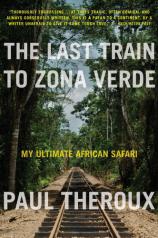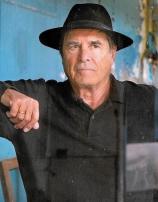The Last Train to Zona Verde: My Ultimate African Safari
Review
The Last Train to Zona Verde: My Ultimate African Safari
In 2010, travel writer and novelist Paul Theroux sketched out a loosely planned itinerary for an overland trek along the west coast of Africa. He prefers to travel in the countryside by train, but this adventure would take him where trains no longer run. So he would take whatever was available --- a train if he could find one, or a bus, but most often it would be a hired car and local driver. In one remote Botswana outpost, the only wheels to be found were on a rusted-out diesel van so decrepit that the door was held shut by a coat hanger. It was stuffed with young men, women with babies, and one increasingly grumpy old white man (Theroux) for a 300-mile jolting ride over often rotting pavement and sandy tracks through bush country.
This was meant to be an odyssey tinged with nostalgia and curiosity of what had become of the Africa he left nearly a half-century ago when he taught in a South African bush school. Theroux arrived as a 22-year-old Peace Corps volunteer. Like so many others of that era, he was filled with hope and enthusiasm for the future of the Dark Continent. Now, at age 70, he returns to a region he had not yet visited: the West Coast from Cape Town through Namibia and Botswana to Angola and beyond. His hopes to make it to Mali and Timbuktu were dashed when civil war broke out and travel was banned, so his 2,500-mile trek ends in northern Angola.
"THE LAST TRAIN TO ZONA VERDE is an enlightening look at a continent plagued by such a massive divide between wealthy and poor that it serves as a warning clarion call to the exploiters of the world."
Theroux’s crystalline narrative hums with authenticity. He can be lyrical as he describes a massive herd of elephants he happens on in the wild in the Okavango Delta, or cynical as he joins ultra-wealthy ecotourists at a night-lighted viewing stand to observe lions, giraffes, hippos and zebras come to drink at a fenced-in water hole at a $5,000-a-day safari camp. His driver mutters, “What’s the difference between this and a zoo?” but is shushed by a camera-snapping German tourist, holding an icy beer in his free hand. Theroux visits an elephant refuge built to rehabilitate the largest mammals on earth rescued from zoos and circuses, or the orphans resulting from culls in overpopulated herds at Africa’s many game preserves. He laments the complete absence of wildlife on the vast landscape of lush green bush vegetation in Angola, the result of a 30-year war that left behind only tens of thousands of unexploded land mines and the rusting hulks of personnel carriers, tanks and canons.
Theroux also shares his palpable fear as he navigates on foot through the border crossing from Namibia into Angola, hounded by thuggish young boys and accosted by brutish border guards. If you have walked through a border station in the American Southwest, you may roughly identify with his feeling of invasion and concern for valuables. Tiajuana, Nogales or Juarez are a pleasant stroll compared to crossing into the dystopia that is Angola.
Angola, perhaps the wealthiest nation-state on earth due to its vast natural resources of diamonds, gold and now awash in a sea of oil, is also occupied by the world’s poorest. For centuries it has exploited its treasures --- earlier through the international slave trade, then when slavery was abolished, and as gold and diamonds were discovered, the men and children once destined for slave ships were driven into a new form of slavery in the mines. When a vast sea of oil was discovered beneath the country, more billions of dollars flowed into the coffers of the expats who arrived to reap their rewards. The most recent exploiters are the Chinese who manufacture building materials and are increasingly buying up development land.
Theroux’s trip began, buoyed with anticipation and preconceived doubts about the effectiveness of non-governmental organizations. He has harsh words for the dilettante rock stars and movie moguls who flit into Africa to raise funds and drop millions of dollars for a school or hospital, then leave in their private jets to return to their snug harbors in free countries. In his curmudgeonly style, Theroux verbally jousts with local officials or NGO directors about the corrupt local governments that siphon off the hundreds of billions in money and medical aid that never reach those they are supposed to help. He posits that perhaps the dependency on handouts to the poverty-stricken natives may do more harm than good.
This very personal journal records Theroux’s edification as he moves further into the interior and comes to the conclusion that the “Africa Problem” is so complex and deep that a solution is elusive if not impossible. He finds some successful attempts by NGOs and foreign aid, but many others that fail abysmally. The burgeoning population growth, disease and gaping maw of poverty are devouring the continent.
THE LAST TRAIN TO ZONA VERDE is an enlightening look at a continent plagued by such a massive divide between wealthy and poor that it serves as a warning clarion call to the exploiters of the world. Theroux is no environmentalist or crusader; he reports what he sees through his gimlet eye with eloquent prose. It is a gripping read for anyone interested in today’s Africa.
Reviewed by Roz Shea on June 7, 2013
The Last Train to Zona Verde: My Ultimate African Safari
- Publication Date: May 13, 2014
- Genres: Nonfiction, Travel
- Paperback: 368 pages
- Publisher: Mariner Books
- ISBN-10: 054422793X
- ISBN-13: 9780544227934





